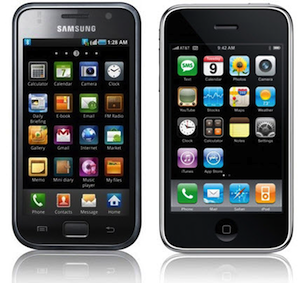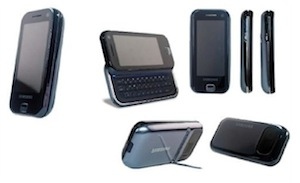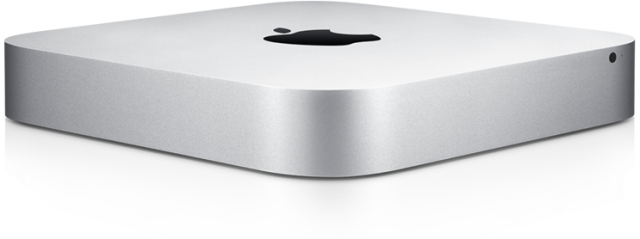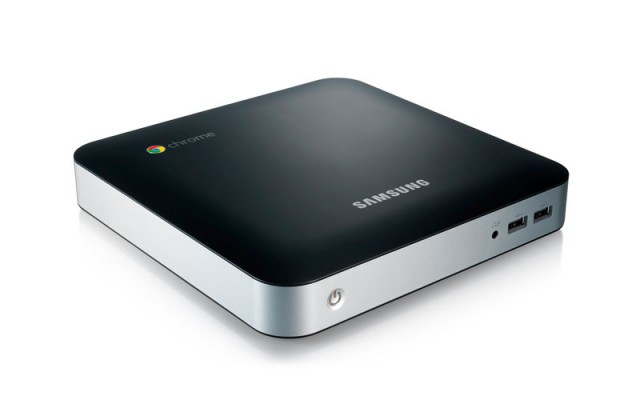August 13, 2012
Written by Jim Dalrymple
Anil Dash:
If anyone questioned whether Microsoft could get back in the fight once the cuffs finally came off, Surface should put those doubts to rest. The gorgeous PC/tablet hybrid is the only example in recent memory of a company clearly and emphatically going toe to toe with Apple on the industrial design front. The iPad will have to improve. Android tablets will have to improve. Surface isn’t another me-too device—it moves the entire category forward.
Incredibly kind words for a product that nobody has even used yet. “Moves an entire category forward”? Bullshit.
Written by Jim Dalrymple
Six Revisions:
Icon fonts are font files that have symbols and glyphs (e.g. arrows, folders, magnifying glasses) instead of standard alphanumeric characters.
There are a few really good collections.
Written by Peter Cohen
Dante D’Orazio for The Verge:
Amazon’s collection of E Ink Kindles is getting thinned out in what looks quite clearly to be preparation for new models.
Jim’s fond of saying that Kindles are stupid, but I know a lot of people that own them and love them. So news that new Kindles are coming shouldn’t be a total surprise, especially with the new school year coming up soon and the holiday buying season not far behind it. It’ll be interesting to see what Amazon does next.
August 12, 2012
Written by Jim Dalrymple
Ben Brooks questions about Apple and Samsung’s design teams were funny.
Written by Jim Dalrymple
Gabe Weatherhead from Macdrifter.com recently moved his WordPress site to the static-file based Pelican system. He gives a wonderfully detailed look at why and how he did it.
August 11, 2012
Written by Peter Cohen
Kelly Guimont for TUAW:
Twenty-five years ago today, HyperCard was released at Macworld Expo Boston. Apple’s software construction kit for the rest of us began shipping on every new Mac as of August 11, 1987; you could also buy it for $49. It required 1 MB of memory (yes, one megabyte) and a pair of 800K floppy drives, or one floppy drive + a hard disk. (Announced at the same time: the ImageWriter LQ, the Apple Fax Modem, and MultiFinder.) Times have indeed changed.
HyperCard inspired a generation of Mac users to think about how they could interact with their machines in ways they never could before – creating their own stacks to do everything from keep track of recipes to business applications to games (Myst, famously, started as a HyperCard stack).
Written by Jim Dalrymple
Nicklas Lind put together a nice list with pics. Seriously, it shouldn’t be this easy folks.
Written by Jim Dalrymple
Bryan Bishop for The Verge:
During cross-examination, Samsung attorney Kevin Johnson attempted to discredit Balakrishnan, first by trying to insinuate that two slides presented by Apple were incorrect. In fact, the images Johnson showed featured representative stills from a video the slides actually contained; the video itself was consistent with the labeling and testimony. Johnson then challenged Balakrishnan by giving a live demonstration of a 7-inch Galaxy Tab that didn’t incorporate the bounce-back feature — while neglecting to mention what operating system or skin it was running. He followed it up with a video that he said proved the Galaxy Tab 10.1 didn’t use the feature either. Unfortunately for Johnson, Balakrishnan had to point out that in the video the user wasn’t actually scrolling to the end of the web page in question — a requirement to trigger the feature in the first place.
The only reason you would do this is if you’re guilty.
I saw this on the AppleInsider forums last night and laughed so hard. Credit to GTR.
According to Samsung these are nothing alike:

But these are:


August 10, 2012
Written by Jim Dalrymple
Most important are the designer’s statements regarding the handset’s design inspiration, which she claims came from a bowl of water and not from any Apple patents.
I would have guessed a bucket of shit, but okay.
Written by Shawn King
NASA:
On the nights of Aug. 11th through 13th, the best meteor shower of the year will fill pre-dawn skies with hundreds of shooting stars. And that’s just for starters. The brightest planets in the solar system are lining up right in the middle of the display. The Perseid meteor shower peaks on the nights around August 12th as Earth passes through a stream of debris from Comet Swift-Tuttle.“We expect to see meteor rates as high as a hundred per hour,” says Bill Cooke of NASA’s Meteoroid Environment Office. “The Perseids always put on a good show.”
NASA even has a free app you can use to count meteors and upload the data to researchers.
Written by Jim Dalrymple
Michael Mulvey brought up another great point to Marcelo Somers “Linkblog Cancer” post that I linked to yesterday:
If I don’t have a unique perspective to the link in question, I usually won’t link to it. I don’t want to be the noise in the conversation.
That’s a great point. I believe readers are looking for a writer’s perspective. There are lots of places to get the news, but each writer has their own perspective.
Written by Jim Dalrymple
Horace Dediu:
What is surprising is that the overall sales volume is not growing. At least for the products catalogued (which exclude the Note) growth for the last four quarters has been: 5%, 34%, 31%, -53%. These are in stark contrast to the iPhone pattern shown in the outline bars behind Samsung’s.
Interesting article from Horace.
Written by Jim Dalrymple
Many thanks to Harvest for sponsoring The Loop’s RSS feed this week.
We’re more than halfway through 2012. You can’t buy that time back, but you can start tracking it wisely. Use Harvest to log your billable hours, and see where your business spends its time. Start a timer effortlessly from your desktop, web browser, or iPhone. Get insight into your projects with powerful, visual time reports. Turn your hours into a professional invoice in seconds. Try Harvest absolutely free for 30 days, and get back on track towards a productive finish to the year.
Here is Apple’s Mac mini first released in 2005.

And here is Samsung’s new Chromebox.

It’s been pointed out before, but just another example.
Written by Jim Dalrymple
Samsung could face penalties from the U.S. District Court in Northern California after one of its lawyers involved in the patent battle against Apple admitted that she hadn’t file the paperwork necessary to practice law in front of the court.
Samsung’s lawyers haven’t been impressive so far.
August 9, 2012
Written by Jim Dalrymple
Wish You Were Here, released in September 1975, was the follow up album to the globally successful The Dark Side Of The Moon and is cited by many fans, as well as band members Richard Wright and David Gilmour, as their favorite Pink Floyd album.
Gilmour and Roger Waters are incredible.
Written by Jim Dalrymple
Documents filed by Samsung lawyers on Thursday reveal that from June 2010 through June 2012 Samsung sold 21.25 million phones, generating $7.5 billion in revenue. On the tablet side, the company sold 1.4 million Galaxy Tab and Galaxy Tab 10.1 devices, producing $644 million in revenue.
That doesn’t seem like a lot of sales to me. Maybe most of their sales are international.
Written by Jim Dalrymple
The unauthorized access included email addresses associated with Battle.net accounts in all regions, outside of China. Additional information from accounts associated with the North American servers (which generally includes players from North America, Latin America, Australia, New Zealand, and Southeast Asia) was also accessed, including cryptographically scrambled versions of passwords (not actual passwords), the answer to a personal security question, and information relating to Mobile and Dial-In Authenticators. It’s important to note that at this time, Blizzard does not believe this information alone is enough to gain access to Battle.net accounts.
At least it wasn’t clear text passwords.
[Via Mac Rumors]
Written by Jim Dalrymple
Marcelo Somers:
Our job as independent writers isn’t to be first or even to get the most pageviews. It’s to answer the question of “so what?”. Taken as a whole, our sites should tell a unique story that no one else can, with storylines that develop over time that help bring order to the chaos of what we cover.
Marcelo has a lot of good points in his article. To me blogging is about honesty and personality. I hate reading something that is just bland words with no feeling or conviction. I want to know how the writer feels about the subject they are writing about.
That’s what I try to do. It doesn’t mean that everyone will agree with what I write, and that’s okay, but I am giving you my honest opinion.
Written by Jim Dalrymple
Eric Slivka:
But a source has now revealed to MacRumors that Apple’s retail stores have been given authorization to match these discounted prices from approved major retailers and carriers.
I never thought Apple would do that, but good for the consumer that wants to purchase from an Apple retail store.
Written by Jim Dalrymple
We’ve seen some pretty spectacular thesis projects by up and coming designers over the years, but never before have any of those projects involved a 6+ month-long road trip through small towns all across Sweden.
Very cool. No money changes hands for his design work, only goods and services that allow him to continue the journey.
Written by Jim Dalrymple
Ilya Birman sent this to me today. It’s a sign in Russian, but translated. Clearly people aren’t confused about things. Definitely not.
Written by Jim Dalrymple
Mike Beauchamp defines “Benchmarking” and “copying” for Samsung.





